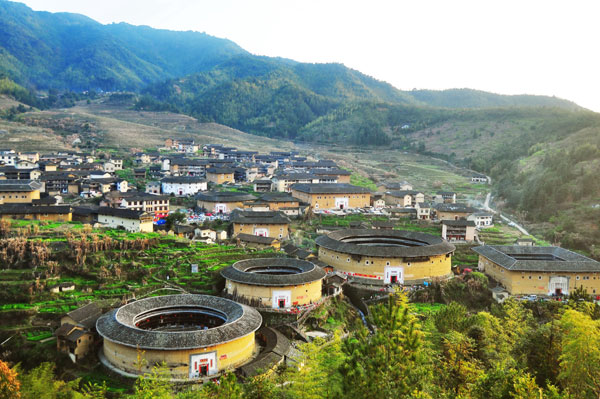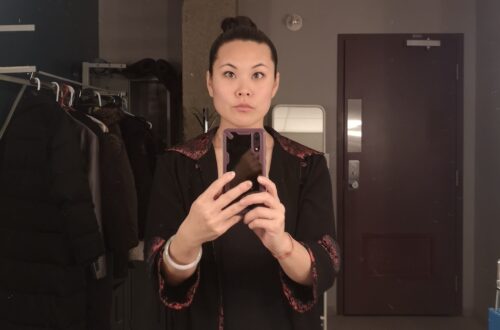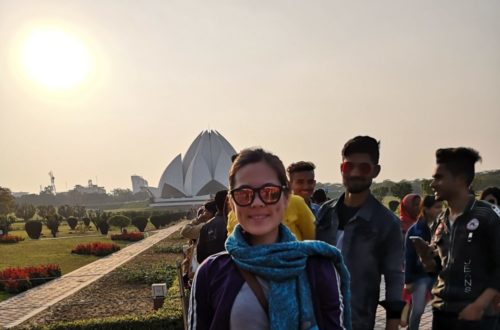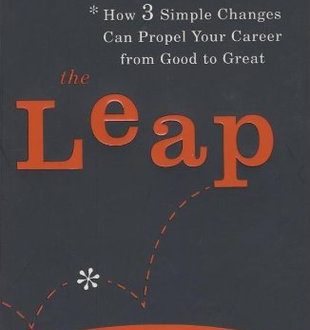
Going Back to my Roots
+ This post is from the first edition of my blog entitled You Are Here+
At a birthday party the other weekend, I shared with one of my friends something I’ve been thinking about a lot lately: My quest to return to my Chinese roots and to re-claim this part of me that I’ve spent so many years denying. He said how cool he thought it was and suggested that I write a post about it on my blog. Here it is!
I’m a first generation Chinese Canadian. While my sister, brother, and I were born in Montreal, my parents emigrated from Kolkata, India over 40 years ago. I’m Hakka Chinese. When this comes up in conversation, which is not uncommon, people usually require further explanation, “So you’re part Indian??”
“No, I’m full Chinese, it’s just that on both sides, my grandparents immigrated to India from China, and that’s where my parents were born. There was actually a significant community of Chinese people over there.”
Even despite the amount of migration that takes place globally and across cultures, people still seem to be taken by surprise when they hear this. Sometimes they’ll probe for more information, which I’m always happy to provide to the best of my abilities. It’s in attempting to tell my family’s story, however, that I realize how uninformed and disconnected I truly am from my roots.



To begin, I usually explain that the Hakka are like a tribe of nomads. When looking at the Chinese characters for “Hakka”, the literal translation is “guest people”. While both my grandfathers originated from the province of Guangdong in China, they both immigrated to India at some point (more research required). I go on to explain that there are Hakka people everywhere – a huge population in Taiwan, Mauritius, Jamaica, Australia, all over Europe… in Canada, there’s an enormous Hakka community in Toronto. The reason why my people are called “guests” is because they had originated from Northern China, but for different reasons, were forced to move further south in several waves of mass migration (still more research required). Every time they settled, the locals were not exactly welcoming, and the Hakka had no choice but to settle in the hills and on infertile land. Eventually, many left China to settle on a different land altogether. For this, they are known to adapt easily and to come out on top in order to make a life for themselves no matter the circumstances.
Now this next tidbit I don’t normally share with others, but when I think back, this may have been the first moment I ever felt proud to be a Hakka woman.
When I was taking an elective course in spoken Chinese (Mandarin) at the University of Queensland, the professor had actually brought up the Hakka people one day in class. I remember her asking if anyone in the room was of Hakka descent. About 8-10 people raised their hands. She then asked which of us were fully Hakka, with both of our parents descending from this lineage. Hands went down and I was the only one left with mine still raised. At this, she seemed pleasantly surprised and went on to tell the class that Hakka women are known to be the fiercest and hardworking of them all, spending full days labouring the unfruitful land until it eventually bore the impossible. She asked if anyone would be interested in marrying a woman of this nature and undoubtedly a few hands went up – had I been more astute at the time, I would have used this to my advantage, but alas, my chance at an Australian romance is now long gone.
**Hakka women were also known to not have engaged in the practise of foot binding, as a great majority of women in China did before the 20th century.
After all these years, even though I listened to the same stories my parents would tell – my mom running out to the street as a young girl to salvage the scraps of coal that had fallen from the coal vendor’s wheelbarrow; my dad attending a boarding school so poor that it was normal to find maggots squirming in his bowl of watery rice; or either of them only ever having the luxury of savouring the sweet juices of an orange or mango on New Year’s Day – I listened and found humour in how completely absurd this reality was compared to my own. I never truly understood what all of these stories meant for shaping who my parents are as individuals, forming a base for their values, and worldview.
It was only after watching a documentary about the Chinese in India that it finally hit me. In this documentary, there’s an Indian film director who speaks about one of his films, Under the Blue Sky (1958). Inspired by his own memories, there’s a Chinese hawker in the film who goes around town selling Chinese silk. Set in the 1930s, the director recalls when he first began to notice the Chinese, which from my understanding was around the beginning of India’s fight for independence. He goes on to mention the two Chinese “pockets” in Kolkata, one of them near a place called Dalhousie Square, Bow Bazar, and the other a place in the east of town where all the garbage was dumped, Tangra, also known as Dhapa – my parents’ hometown.
As a first generation woman of Hakka Chinese descent, it’s taken 30 years for me to understand what this actually means. It’s one thing to get it all in theory, but it’s another thing to feel it resonate in your whole body. I believe this is what we often refer to as an “AH-HA!” moment. When all of a sudden, there’s a full integration of understanding not just in the mind, but in the body and soul.
My upbringing has been a result of the mass migration of my ancestors, the persecution, fear, poverty, and hardship lived by my grandparents and parents. They worked their fingers to the bone when they arrived to Canada, a land of opportunity, so their children wouldn’t have to live the same reality they did. They did not teach us the language believing this would help us integrate better and avoid discrimination. This is the common storyline for many immigrant families. With being born into a story so completely disconnected from my actual roots, however, comes much confusion and disorientation.
Now in my thirties, I feel a need to know my family’s story and to reclaim these parts of me that make up my foundation. How can I continue to move forward otherwise? While as a teenager and young adult I used to feel ashamed and be repelled by anything that appeared too “Chinese”, or while I identified myself as purely Canadian, denying my rich cultural heritage and history, I can now no longer operate at the same level of consciousness.
In the next 5 years, I’d like to plan a trip to return to my parents’ birthplace in Kolkata, as well as pay homage to my family’s ancestral homes in the village of Moiyen in Guangdong, China. With my recent research, I’ve discovered that there are World Hakka Conferences that have been organized over the years, and in 2020, this will be hosted in Toronto (it’s being hosted in Kuala Lampur this year). I also want to begin learning and speaking the language so I can converse with my maternal grandparents before it’s too late…
For the time being, I’ve joined an international Hakka Facebook group called “Hakka United Worldwide” and it’s been amazing to learn how many different dialects of Hakka exist. The diaspora is so widespread! As with so many other cultural groups, the Hakka are all over the world, and from what I gather, trying our best to preserve and promote the culture so future generations can grow and flourish from the roots up, no matter where they may be.
Just like my ancestors, on land that seems almost impossible to till, I want to work as hard as they did to bear fruit from my situation.
From Border to Border: The Chinese in India (the full documentary to which I refer above):


You May Also Like

Acculturation – My Awakening
May 12, 2020
India Pt. 1: My Arrival
April 26, 2020
8 Comments
Thalia
Phoebe!! Im writing you just to let you know that we read your post 🙂 !! that’s so cool, once you told me (I don’t know if you remember) haha but you told me that I should feel lucky coming back to Mexico because we have the opportunity to re-discover our own country, anyway… those words were on my head for a while, thank youuuu!!
admin
Thalia, thank you guys for reading and for the support!
Haha yes, I vaguely remember having that conversation not long before you and Chuy left for Mexico. I hope you are both doing well and enjoying your re-discovery ;)! Hope to cross paths in the near future :).
Cisco Chung
Inspirational. I’m mostly Hakka. Parents from East Timor and have done the trip to moiyen thanks to the fact that I have a second cousin there. It was amazing. Suggest doing a 23andme DNA test. Might yield some new family connections. Please keep posting any updates.
admin
Thank you for sharing, Cisco! I have been hesitant to do a DNA test because I’m mildly paranoid about what the company could do with that kind of information! Haha. But yes, I will definitely keep posting as my story unfolds.. 🙂
Rosie Reynolds
Wow Phoebe! Thank you for sharing your personal story and teaching people like me something so unique about our world and the people in it. I look forward to hearing more of what you learn along your journey. Much love from Australia x
admin
Rosie, thank you for reading and for commenting — missing your beautiful energy and spirit! Sending you much love right back!! xox
Alessandra
Phoebe, I absolutely love this!!! How beautiful. I too have recently been on a quest to reconnect with my heritage, learn the history of my family and visit the villages my ancestors lived. It’s become a huge passion and some people can’t understand why I want to return to a village that might have 100 people but I find there’s so much depth to be garnered. Hope this journey is fruitful, your history is a beautiful part of what makes you so special and unique! Xo
admin
Alessandra, thank you so much! I suppose many of us who grew up together can relate to this storyline 🙂 . I’d love to hear more about your own quest to reconnect to your heritage — a small village with only 100 people must carry a lot of history and connection!! Wishing you all the best!!